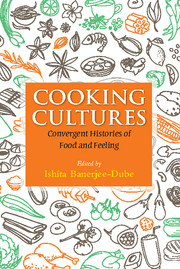Book contents
- Frontmatter
- Contents
- Acknowledgements
- Introduction: Culinary Cultures and Convergent Histories
- Part I Food, Pride, Power
- 1 Indigeneity, Alienness and Cuisine: Are Trout South African
- 2 The Hummus Wars: Local Food, Guinness Records and Palestinian-Israeli Gastropolitics
- 3 Rice, Pork and Power in the Vietnamese Village, 1774–1883
- Part II Cooking, Cuisine, Gender
- Part III Food, Identity, Personhood
- Part IV Food, Myth, Nostalgia
- Contributors
- Index
- References
1 - Indigeneity, Alienness and Cuisine: Are Trout South African
from Part I - Food, Pride, Power
Published online by Cambridge University Press: 05 July 2016
- Frontmatter
- Contents
- Acknowledgements
- Introduction: Culinary Cultures and Convergent Histories
- Part I Food, Pride, Power
- 1 Indigeneity, Alienness and Cuisine: Are Trout South African
- 2 The Hummus Wars: Local Food, Guinness Records and Palestinian-Israeli Gastropolitics
- 3 Rice, Pork and Power in the Vietnamese Village, 1774–1883
- Part II Cooking, Cuisine, Gender
- Part III Food, Identity, Personhood
- Part IV Food, Myth, Nostalgia
- Contributors
- Index
- References
Summary
Man has been defined as a rational animal, a laughing animal, a tool-using animal and so on. We would be touching upon a deep truth about him, however, if we called him a cooking animal.
(Versfeld, 1983, 11)Alfred Crosby famously pointed out that human settlers came to the worlds which they colonised not as individual immigrants but ‘as part of a grunting, lowing, neighing, crowing, chirping, snarling, buzzing, self-replicating and world-altering avalanche’ (Crosby, 1986, 194). In the cases of Australia, New Zealand, India, South Africa, Tanzania, Kenya and Zimbabwe, amongst others, within that avalanche were several fish species, including trout, which were introduced to most of these countries in the late nineteenth century. Trout cannot survive in water which exceeds 25oC and can only breed in running water. So, their presence is restricted to areas of sufficient altitude, and self-sustaining populations require cool clean rivers, though trout live happily in stillwaters into which they are stocked. As a species, both brown and rainbow trout are well established in South Africa where they have been protected by legislation for almost a century. With environmental debates turning increasingly to issues of indigeneity, biodiversity, alienness and invasiveness, more recently there have been vigorous debates in South Africa and elsewhere as to whether, as ‘alien species’, trout should be allowed to stay or be eradicated, and legislation in this regard has been promulgated. The human-political echoes in these arguments are often eerie and unsettling. This chapter uses debates about the continued presence of trout in South Africa to think through the complexities of conceptions of indigeneity, alienness and identity, and how these are brought into different focus if human social and cultural histories inflect the arguments.
‘Trout Still on the Menu’ announced a recent newspaper report in South Africa on the proposed classification of trout as invasive alien species in terms of the National Environmental Management: Biodiversity Act of 2004 (Yeld, 2014). The report was responding to an apparent softening of its position on trout by the Department of Environmental Affairs. The headline is actually both ironic and suggestive. It is ironic as most fly-fishers who pursue trout nowadays practise catch-and-release, and rarely put the trout they catch ‘on the menu’ (though the trout were certainly introduced initially as both food source and recreational angling species, more on which has been dealt with below).
- Type
- Chapter
- Information
- Cooking CulturesConvergent Histories of Food and Feeling, pp. 21 - 38Publisher: Cambridge University PressPrint publication year: 2016



